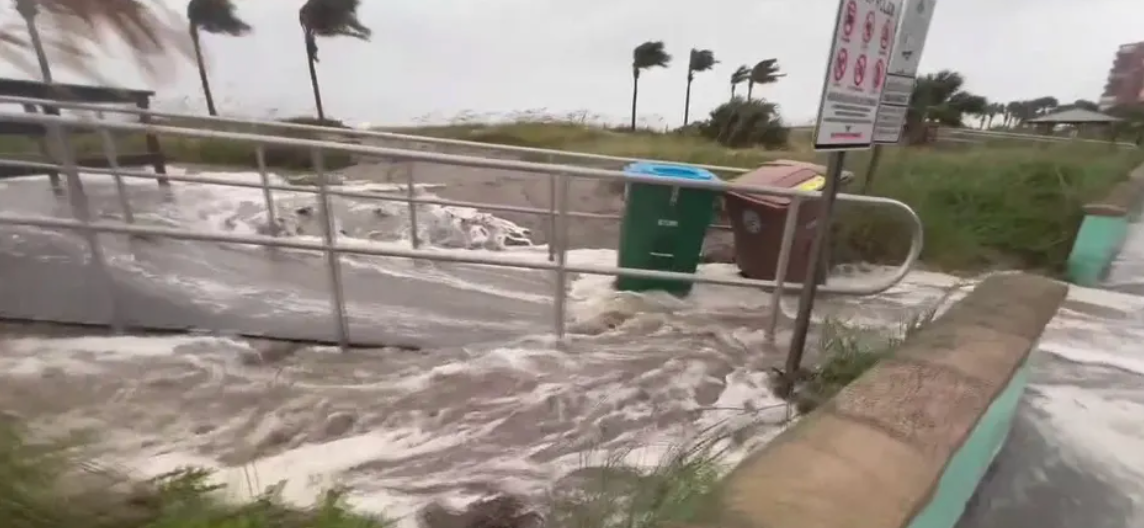Donna Fagersten had taken refuge at a friend’s home on the top floor as Hurricane Helene tore through northern Florida, leaving a devastating trail of destruction and more than 100 casualties in the southeastern U.S.
As the storm appeared to calm, the 66-year-old teacher, just days away from her retirement, made a fateful choice to return home to rescue her cat.
When Hurricane Helene hit Florida on September 26, 2024, around 11 p.m., the Category 4 storm triggered flash floods, forcing residents to scramble for safety. One of the hardest-hit areas was Pinellas County, particularly in the Tampa Bay region, where at least 11 people lost their lives.

Among the victims was Donna Fagersten, a second-grade teacher from Ponce De Leon Elementary in Pinellas County.
According to her best friend Heather Anne Boles, Donna was set to retire the following week after dedicating 35 years to teaching. When the storm hit, Donna sought shelter with Boles and her partner, Mike Moran. As the storm surge rushed in, they retreated to the third floor of Boles’ mother’s home, across from the beach where Donna lived.
Boles recalled that as the storm seemed to settle, Donna insisted on going home to check on her cat, despite Boles’ pleas to stay. Tragically, another surge and high winds returned, battering the coastline.
A neighbor later came to their shelter, reporting that someone had been found floating in the parking garage. They quickly pulled Donna from the water and began CPR, but despite their efforts and the arrival of fire rescue by boat, they were unable to revive her.
Detectives later confirmed that Donna had drowned in her home, which had been flooded with water.
Family and friends have since remembered Donna as a “beautiful person” who was deeply committed to her students and community. In a Facebook post, Mary Gleason Lyons, a colleague and friend, described Donna as a dedicated teacher with a big heart, touching the lives of many students over her 35-year career.

Online tributes poured in, with former students and friends expressing their sadness at her passing and remembering her kindness and warmth.
While Boles and Moran are now left to clean up after the floods, which destroyed most of their belongings, the loss of their best friend is what hurts the most. “This is the worst we have ever seen,” Boles said, reflecting on the storm’s destruction compared to Hurricane Irma, where they managed to keep their home and belongings intact.
On a positive note, Donna’s cat survived, and her friends are working to find him a new home.
Hurricane Helene, which cut a destructive 800-mile path northward, left more than 2 million homes without power and claimed over 100 lives, according to USA Today.
For those who haven’t seen it yet, it is
At first glance, this might seem like just another casual photo of three girls enjoying coffee together at an outdoor café. But take a closer look—there’s something unusual about this image. If you stare at it long enough or follow the instructions to “close your eyes and slowly open them slightly,” you may notice something unexpected.
Have you figured it out yet? If not, don’t worry. You’re not alone! Many people miss it at first. However, once you see it, you can never “unsee” it.
Why This Image Is So Unique

This viral optical illusion has been making waves across the internet because of the powerful hidden figure within it. What appears to be a simple, everyday scene is actually a cleverly composed visual trick that reveals something deeper.
The image’s composition, the arrangement of the girls, and the shadows all come together in a way that forms a familiar and iconic figure—the face of Jesus Christ.
How to Spot the Hidden Image
Not everyone will notice it right away, but if you follow these steps, you may be able to see the hidden miracle within the picture:
- Blur Your Vision: Try squinting or slightly closing your eyes. This softens the details and allows the shapes and shadows to blend together.
- Focus on the Negative Space: Instead of looking at the girls themselves, pay attention to the spaces between them, the shadows, and the background elements.
- Step Back from the Screen: Sometimes, increasing the distance between yourself and the image makes the illusion easier to see.
- Convert It to Black and White: Some people find it easier to see illusions when colors are removed, as it enhances the contrast.
Video : 10 Mind Blowing Optical Illusions
The Power of Optical Illusions in Everyday Life
Optical illusions like this remind us that not everything is as it seems. Our brains are wired to recognize familiar patterns, and sometimes, what we perceive at first isn’t the full picture.
These illusions also highlight an important truth—perspective matters. Just as in life, sometimes we need to take a step back or look at things differently to truly understand what’s in front of us.
Why Do We See Jesus in Random Places?
The phenomenon of seeing faces in everyday objects is called pareidolia—a psychological tendency where our minds recognize patterns, especially human faces, in random stimuli.
Throughout history, people have reported seeing religious images in nature, food, clouds, and even everyday objects. This picture plays on that same idea, cleverly arranging its subjects to form a striking resemblance to Jesus.
A Deeper Meaning Behind the Image
For those who recognize the hidden face, this image carries a powerful message. It suggests that faith can be found in unexpected places. It also serves as a gentle reminder that sometimes, the divine can be present in the most ordinary of moments.
Video : Human Nervous System (Part 2) – How the Brain Works! (Animation)
Whether or not you’re religious, there’s something fascinating about the way our brains can find meaning where we least expect it.https://youtu.be/CurW-sIQPxU
Final Thoughts: Can You See It Now?
So, have you spotted the hidden face in the picture? If not, try looking again with fresh eyes. If you do see it, congratulations—you’ve unlocked the mystery that many others have struggled to find!
This image is a perfect example of how perception shapes reality. It’s also a fun reminder that sometimes, the most beautiful things in life are hidden in plain sight.
Have you ever experienced an illusion like this before? Let us know in the comments what you see and share it with friends to see if they can spot the hidden image too!



Leave a Reply